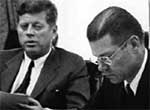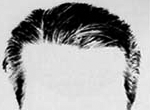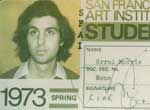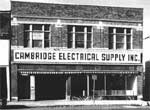By Peter Applebome
The New York Times - December 26, 1999
It is entirely possible that someone other than Errol Morris could have decided to make a nonfiction film about an oddly likable developer of "humane" execution devices who, based on his own utterly dubious science, goes on to gain international fame as a Holocaust denier.
And it's conceivable that someone with a particularly macabre sense of the absurd could have even dreamed up Fred A. Leuchter Jr., an earnest dweeb with a thick Massachusetts accent and a fondness for death chamber technology, who drinks 40 cups of coffee and smokes six packs of cigarettes a day, meets his wife-to-be at the local Dunkin' Donuts and then jets off with her to Auschwitz, and is partial to comments like, "Every time there's a gas execution, it's an accident waiting to happen."
Still "Mr. Death: The Rise and Fall of Fred A. Leuchter Jr.," Mr. Morris's new film, which opens Wednesday (an alternative title, briefly considered, was "Honeymoon at Auschwitz"), seems so much the quintessential Morris project -- with its mix of death and humor, the goony and the profound -- that even Mr. Morris gets a little nervous talking about it, and not just because of the political sensitivity of the subject matter.
"I have this tendency to overintellectualize what I do," Mr. Morris said, at the downtown Manhattan studio where he makes commercials when he's not turning out his own blend of ("don't call them documentaries") nonfiction films like "The Thin Blue Line," the investigation of the murder of a Dallas policeman; "A Brief History of Time," about the cosmologist Stephen Hawking, and "Fast, Cheap and Out of Control," a profile of four amiable obsessives.
"But I like least of all explicating this one," he said. "Don't get me wrong. I can and will babble on about it. But I prefer to have people look at it and see what they make of it, in the way I did it thinking: 'What am I doing? What am I really doing? It's no accident, after all, that two people obsessed with death, namely me and Fred Leuchter, end up in Auschwitz, the epicenter of 20th- century death."
Mr. Morris is 51, with graying hair and a chunkier frame than when he first became well known with "The Thin Blue Line." He grew up in Hewlett, on Long Island, where his father, a doctor, died when he was 2 years old, and his mother, a Juilliard-trained music teacher, raised him to be a concert cellist. He went to science-fiction films like "This Island Earth" and "Creature From the Black Lagoon" with his Aunt Rosalind, studied history at the University of Wisconsin and enrolled in a doctoral program in philosophy at the University of California at Berkeley, where he worked toward a Ph.D. that he never quite finished.
But he soon gravitated toward film and, in particular, interviews with the eccentric, the marginal and the sometimes dangerous. Before long, he had more or less invented a hybrid form that treats nonfiction events and real people in a way that mixes sober interviews with sometimes surreal re-enactments. It is to the conventional documentaries of, say, the Burns brothers as Chagall is to Grant Wood.
Fans of Mr. Morris's intensely odd, cerebral films will find themselves on stylistically familiar terrain in "Mr. Death." Mr. Morris's films, at their heart, are about, to use a ridiculously overblown word from his philosophy days, epistemology -- the nature of knowledge: what things are and what they seem to be, how people know what they think they know, and do they really know it or just think they know it? His main device is simply to sit his subjects in front of a device he invented called the Interretron, a two-way mirror that allows a subject to speak into the camera while seeing Mr. Morris's face. It's not entirely clear whether people respond to the process or to Mr. Morris's disarming absent-minded-professor persona. But whether it's the people in "Gates of Heaven" babbling on about the pet cemetery business or the bizarre cast of "The Thin Blue Line," in which the only honest man is a a drifter wrongly convicted of a murder he did not commit, his subjects tend to natter on endlessly as if injected with some sort of truth serum.
AT his best, the end result is work that's one part Freud, one part William James and one part the Marx Brothers. Or, as someone once suggested, a cross between "60 Minutes" and "The Twilight Zone."
"I've always believed that people construct for themselves some kind of world they live in that they reveal through language," Mr. Morris said. "So putting people in front of a camera and letting them talk is a way of creating a kind of interior monologue, a monologue about self, and people always say really surprising things. In "The Thin Blue Line," one witness, Emily Miller, says: 'Everywhere I go, there's murders, even around my house.' It tells us a lot about Emily Miller. Not that everywhere she goes there are murders, but that she sees herself as a protagonist in a crime drama. She is living in some whacked-out Boston Blackie movie."
In "The Thin Blue Line," Mr. Morris's 1988 account of the Texas murder case, the interviews and his own sleuthing solved a murder that sent the wrong man, Randall Dale Adams, to Death Row and set the real killer, David Harris, free to kill again. This time his subject is much more weighty. He's trying to solve the mystery of the Holocaust: not did it happen, but how could it happen? And the answer, subject to a million different interpretations, lies in the passionately matter-of-fact stream of verbiage pouring out of Mr. Leuchter's mouth.
Mr. Leuchter, whose story unfolds like a mixture of something out of Vladimir Nabokov and Kurt Vonnegut, grew up the son of a Massachusetts correction officer. As an adult, he developed the ultimate niche business in Malden, Mass., designing and repairing execution chambers for the states that have capital punishment. His goal, he says, is to make them more humane rather than faulty electric chairs, which he says, torture their victims while "cooking the meat." He proposes, for example, a lethal-injection chamber more like a dentist's office with a contoured chair, television and perhaps pictures on the wall (the film posits a peaceful scene out of Currier & Ives) rather than a gurney and bare walls. It's a career, he explains in a spectacularly unconvincing observation, much like any other. "There is no difference between a life-support system and an execution system," he allows, adding the subtle proviso, "except that if a life-support system fails you die, and if an execution system fails you live."
For the first third of the film we're in the eerie but vaguely terrestrial realm of Mr. Leuchter's death-implement business. But in the 1980's, Mr. Leutcher found himself a central figure in a far darker drama. He was hired by a neo-Nazi named Ernest Zunder, author of tracts with titles like "The Hitler We Loved and Why," to disprove the existence of the Holocaust. In February 1988, Mr. Leuchter took off for Poland, where in a stunning act of desecration, he used a hammer and chisel to knock off pieces of the walls of crematoria, which were later subjected to chemical analysis that found no traces of cyanide. From this, he deduced, in a report hailed by Holocaust deniers around the world, that the Holocaust never happened. The report, distributed over the Internet and disseminated by neo-Nazi groups, made him famous in a shadow world but ruined him in his own. Hounded by critics, he lost his business, and his marriage eventually fell apart.
As the film explains, the science of the study was thoroughly flawed, and even the chemist who did the analysis of the fragments told Mr. Morris that the findings were meaningless. It turned out that most of the surfaces Mr. Leutcher had used had been dismantled, dynamited and subjected to the elements in a way that made them useless for analysis. Besides, cyanide gas, if any existed, would have penetrated less than a hairbreadth beneath the surface of the walls. So when Mr. Leuchter took samples by gouging out chunks of the walls, he diluted his sample by upward of 10,000 times, Mr. Morris said.
Mr. Morris demolishes the spurious science of the report almost as an aside. And in the end what really intrigues him is not Mr. Leuchter's report but Mr. Leuchter's mind.
"Not that I wear a hat, but if I did, as a practitioner of this particular form, I would take my hat off to Fred for being such a worthy subject," Mr. Morris said. "So when Fred talks about painless executions, you have to wonder, what's going on here? What can he mean? And when he goes to Auschwitz, the job he's least qualified of all to do, and comes back thinking that somehow he had irrefutable knowledge, that he has the truth, you have a study in hubris and vanity that you could not make up. My question for Fred was, 'Do you ever think you might be wrong?' and his answer was very interesting. He doesn't say, 'No.' He says, 'I'm long past that.' "
Mr. Morris, of course, would be a perfect subject for his own movies, not just because he's such a good talker but because he's such an expressive one. He speaks in eloquent bursts, usually punctuated at the end by a quick, bemused snort. The snort is followed by a pause, and then another verbal excursion.
"I get myself in trouble when I say I like Fred, because that needs to be followed by various qualifiers that I can find him sympathetic and likable but find his work not at all sympathetic or likable, but I almost see him as a lovable idiot. He's like a character out of Nabokov, who pioneered the technique of the clueless narrator. But the real question about the film is something that goes back to Plato. Do people have evil in their hearts, or do they do sometimes commit truly despicable acts while convincing themselves they're good? It's the reason the Eichmann trial, to mention the obvious example, became such a watershed.
"So Fred seems himself in various ways. He sees himself as a humanitarian, the Florence Nightingale of Death Row, the man who took the ouch out of the death penalty. He's a concerned citizen, seeker of truth, civil libertarian. Who would speak for people like Zundel if not him? Finally, he sees himself as ultimately a Christlike figure, hounded and persecuted and reviled, as he sees it, because of his inherent goodness and correctness."
This, of course, is very sensitive terrain, so sensitive the film almost did not get made. Mr. Morris conducted his interviews with Mr. Leuchter in 1992, and they sat around for five and a half years because no one wanted to finance the project. Mr. Morris recognizes that his film gives voice to ideas usually not given a public forum.
"I don't think this movie suggests in any way that Fred's ideas are sympathetic, because obviously I don't," said Mr. Morris, who is Jewish and who lost relatives in the Holocaust. "But I do think Holocaust denial is something worthy of examination. The Holocaust itself is worthy of examination. It's the epicenter of evil in our century. It was unfathomably evil, but looking at it is a good thing rather than a bad thing. And Holocaust denial, in my view, is an alternative route into the Holocaust."
Mr. Morris has many other alternative routes in mind for the future, many of them projects that have been percolating for years, like "Weirdo," about the breeding of a giant chicken, or "Insanity Inside Out," the story of a man who was wrongly committed by his parents to a mental institution until freed by the Supreme Court. ("The tagline," he said, "is: 'You seek vindication from the highest tribunal in the land, namely your parents. When that fails, you go to the Supreme Court.' ")
Mr. Morris is also preparing a television series of interviews with the famous and the nonfamous, in between doing commercials, like an elliptical series on real men for Miller Beer that is almost as offbeat as his films. And he's hoping to find a way to do a fiction film that works the way his non-fiction ones do.
Whatever worries Mr. Morris may have, running out of material is not one of them.
"After doing this since the early 70's, I think I've got good and bad news," he said. "The bad news is that rationality is the exception, not the rule. The good news is, that works well for my art."
A Taste for the Eccentric, Marginal and Dangerous
REVIEWS/ARTICLES
Todd McCarthy (Fog of War)
Fred Kaplan (Fog of War)
Samantha Power (Fog of War)
Ron Rosenbaum (Fog of War)
Kenneth Turan (Fog of War)
Ron Rosenbaum (Mr. Death)
Todd McCarthy (Fast, Cheap & Out of Control)
David Ansen (Fast, Cheap & Out of Control)
Roger Ebert (The Thin Blue Line)
Terrence Rafferty (The Thin Blue Line)
Janet Maslin (Vernon, Florida)
Alan Berger (Gates of Heaven)
Michael Covino (Gates of Heaven)
Roger Ebert (Gates of Heaven)
MORE MR. DEATH
Synopsis
Transcript
Gallery
New Yorker Profile (Singer)
BUY THIS MOVIE
Amazon
OTHER FILMS
Gates of Heaven
Vernon, Florida
The Thin Blue Line
A Brief History of Time
Fast, Cheap & Out of Control
The Fog of War
Standard Operating Procedure
Tabloid
The Unknown Known
The B-Side
Wormwood American Dharma






